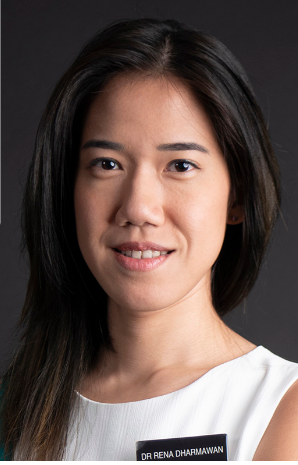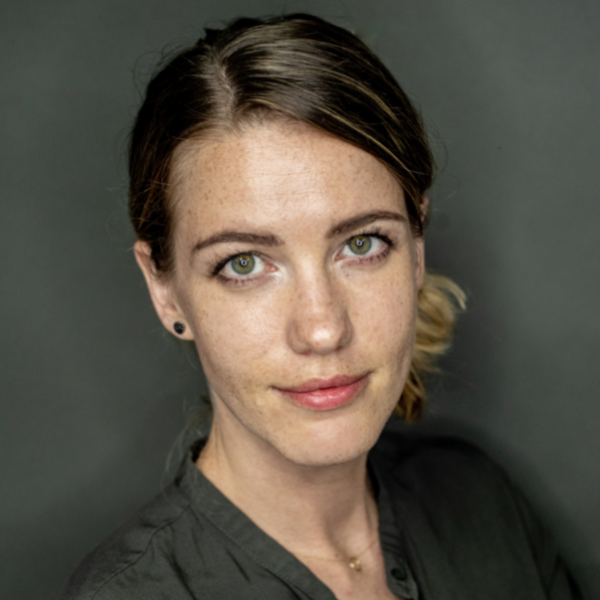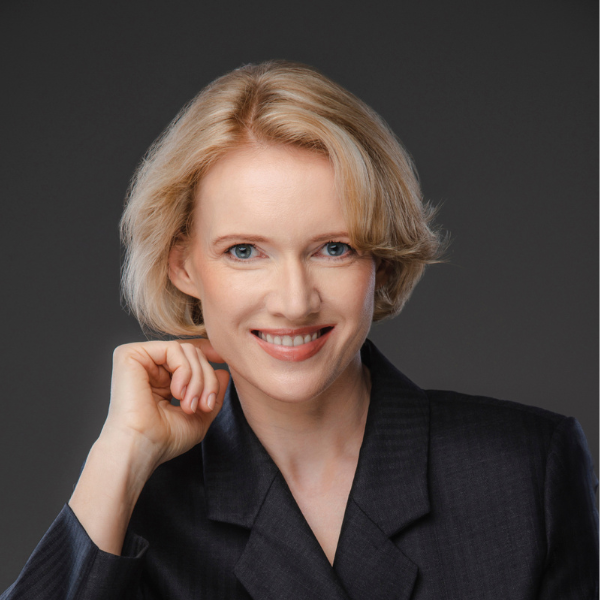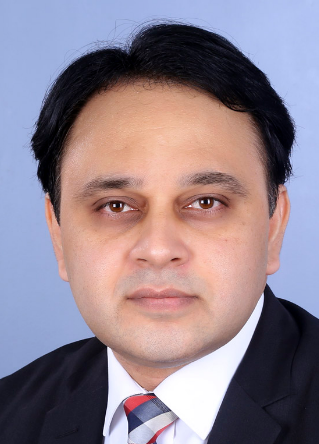INSEAD’s strong focus in entrepreneurship and technology was a perfect fit for my passion in healthtech and medtech innovation.
Rena Dharmawan

Fun fact about yourself
I started college at 16!
Extracurricular Activities, Community Work and Leadership Roles
With the COVID-19 pandemic, I was very fortunate to be involved in a community project called SwabBot, the first fully patient-controlled robot to improve the quality and comfort of nasopharyngeal swabs for the diagnosis of COVID-19. It is a co-development between Singhealth clinicians and Biobot Surgical Pte Ltd. It was developed to reduce the need for healthcare professionals to perform nasopharyngeal swabs. This reduced exposure of healthcare workers to patients with potential SARS-CoV2 disease, to improve the quality of nasopharyngeal swabbing procedure and improve the throughput for mass screening purposes during this COVID-19 pandemic.
Singhealth and Biobot Surgical Pte Ltd have filed a patent for the product, and a licensing agreement is in the process of discussion between the two entities. SwabBot™ has been registered with the Health Science Authority as a Class A medical device and BioBot Surgical is in preparation for CE marking for global commercialisation.
Which academic or extracurricular achievement are you most proud of during business school?
I was given the opportunity in Duke NUS Medical School to develop a healthcare innovation fellowship for our third-year medical students from scratch sometime last year.
With the teachings and learning points I attained since starting INSEAD’s GEMBA programme last August, I have grown the team from just myself to three people, crystallised the vision, laid the foundations and curriculum of the programme, completed the recruitment of our six pioneering fellows, confirmed our six like-minded clinician and industry mentors for each team, and also raised enough funding for our first run this coming year.
The fellowship, which will launch in August 2022, will take these medical students through the entire innovation process in a multidisciplinary student team, which includes an engineering and a business student. They will be mentored by a clinician and startup founder and develop a technology solution to a real unmet clinical need.
The aim of this programme is to really enable these students to incorporate innovation in their medical career and train them to be Clinician-Innovator Leaders in the local/regional healthcare innovation ecosystem.
What achievement are you most proud of in your professional career?
I am definitely not the typical surgeon and never afraid to be different. Always a pioneer, I was the first surgical resident and medical officer ever to take a year of residency do the prestigious Singapore-Stanford Biodesign (SSB) fellowship in 2014 to dive deep and learn the nuts and bolts of medical device innovation from the experts.
Following that, I continued with my entrepreneurial spirit, on top of completing residency and practicing as a Head & Neck and General Surgeon.
I have also co-founded three local medtech startups: Privi Medical, Jaga-Me and Aardvark Labs/CATALYST, all within the span of four years, and all with different stories behind them.
Privi Medical developed a safe and effective home product for hemorrhoids, which received FDA approval in 2018 and was recently acquired by larger medtech company for commercialisation.
Jaga-Me is a thriving Singapore-based healthtech startup providing trusted specialist nursing care at the comfort of our patients’ home.
CATALYST was an ecosystem-building co-working space for medtech and healthtech startups which launched in 2019, but has since closed due to the COVID-19 pandemic.
I am very humbled and honoured to have been given the opportunity to be involved in the founding of these three start-ups, working with motivated individuals with complementary strengths and weakness.
Moving forward I hope to continue venture-building and create useful technology solutions to unmet clinical needs and also, importantly, to train and inspire the next generation of Clinician-Innovators in Singapore and the region.
Why did you choose this school’s executive MBA programme?
INSEAD’s Global Executive MBA programme stood out to me for its diversity, not just in nationality, ethnicity and gender, but also professional backgrounds with classmates and alumni coming from numerous different industries.
Having three different campuses in Fontainebleau, Abu Dhabi and Singapore also opens doors to more opportunities to network across the globe. Their motto of being “The Business School of the World” really gravitated in me. Since embarking on this journey, I can confidently say that this vision truly holds true.
In addition, INSEAD’s strong focus in entrepreneurship and technology was a perfect fit for my passion in healthtech and medtech innovation.
Lastly, I have to also commend on the quality of the faculty and curriculum of the EMBA programme. Coming from an engineering and medical background, business topics were absolutely Greek and foreign to me.
I am very pleased that the faculty were all very patient and approachable, and somehow manage to teach these very difficult topics (at least according to me) in ways we could all understand and apply in our work and careers.
What is the biggest lesson you gained during your MBA and how did you apply it at work?
One of the biggest lessons I have learnt from my MBA thus far is that “Diversity brings strength.” However, diversity does not come naturally all the time. Thus, as a leader, one needs to actively be aware of this bias and try to be more objective so as to break the bias.
Again, when I speak of diversity in teams, it is not just about gender, but also ethnicity, nationality, personalities, characters, previous work experiences and even ones’ strengths and weaknesses.
For example, in surgery, we tend to recruit residents who are very stereotypically and subjectively what we consider “surgeon-material”: Type A, efficient, fast, aggressive, ambitious, and sporty to name a few characteristics. This creates a generation of surgeons very effective and skilled in surgery and clinical practice, but lacking diversity in other aspects that could potentially bring value to the department.
Acknowledging this, we have since included more objective measures into our residency selection criteria to ensure we also consider individuals outside of this typical “surgeon-material”: residents who are keen to pursue research, science, innovation, education, administration etc.
Give us a story during your time as an executive MBA on how you were able to juggle work, family and education?
I will never dare to claim I do it well, but juggling the different aspects of my life since the start of GEMBA has not been easy but doable.
Having a busy surgical practice in the biggest public hospital institution in Singapore, an academic position developing a new innovation fellowship for medical students (pretty much is like a start-up on its own), two young and feisty children and lastly managing school and EMBA coursework has taught me valuable lessons on time management, prioritisation and efficiency; to spend my time on things that matter the most to myself.
Many times, I had to decline attending late social gatherings with classmates after classes or in between modules just so I could put the kids to bed and read them their bedtime story. As much as possible, I try to integrate these social gatherings and networking events during the weekend to include the kids by hosting them and their families over at my place for meals or playdates.
Some may argue I may not be getting the full-on MBA experience, but I am thankful to have made some very close friends and have to say I have fully embraced MY OWN EMBA experience.
What advice would you give to a student looking to enter an executive MBA programme?
To “Just Do It!” if you are given the opportunity!
Embrace this experience and come in with an open mind. Leave behind all previous fears and preconceptions and allow yourself to be vulnerable to try something different and out of your comfort zone!
What is the biggest myth about going back to school?
Myth: It is difficult and impossible.
Truth: It is not easy, but not impossible
Which MBA classmate do you most admire?
Jamie Ramsamy, Head of Compliance in Thome Group.
I really appreciate Jamie for his down-to-earth character, calm demeanour in times of crises, intellectual capabilities, and honesty. From our many conversations, I can tell that at work he is well-respected, not just from his superiors and bosses, but also his team and employees.
He is driven, forward-sighted, and able to devise and implement strategies within his company. I have no doubt he will make it to the C-suite very soon. In class, he is responsible and a team player, taking on and completing his given tasks well, even in topics he isn’t an expert on. I have to say that he is definitely my top choice of a teammate for any group projects in class.
On a more personal level, Jamie is a great friend and confidant, someone I trust to give me an honest opinion and a go-to-person for tough situations or dilemmas I am facing. I am extremely thankful to have met him in our GEMBA programme, for our friendship and to be able to call him one of my closest friends in school.
What was the main reason you chose an executive MBA programme over part-time or online alternatives?
I wanted an in-person MBA experience and with two young kids at home, it is not possible for me to do a part-time evening course as I prioritise my after-work hours and the weekend to spend time with the kids.
Also, the DNA of classmates and colleagues in an EMBA programme is extremely different from that of the regular MBA programme. In the stage of my career now – and in my aspirations for the future – the connections and network I create suited the EMBA genotype better.
What is your ultimate long-term professional goal?
I want to continue building ventures and solutions to unmet clinical needs to improve my patients’ outcomes, inspire the next generation of Clinician-Innovators and be a Leader in Healthcare Innovation in Asia.




